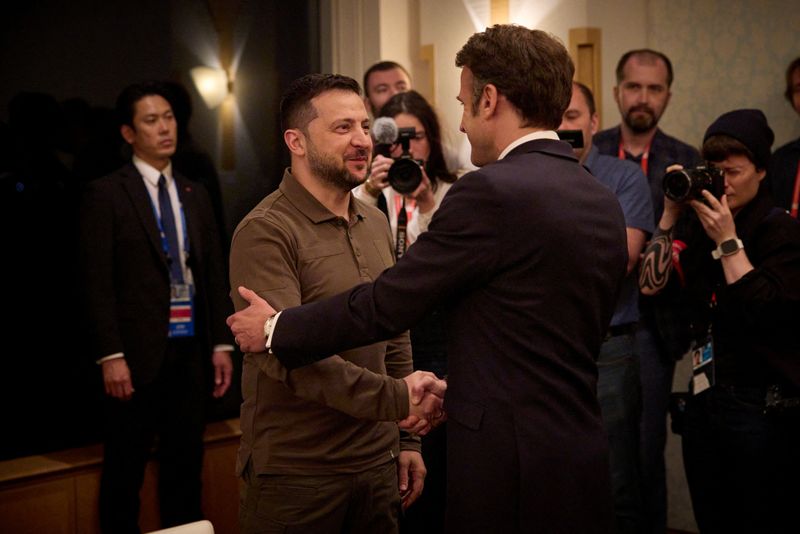By Dan Peleschuk and Jeff Mason
HIROSHIMA, Japan (Reuters) -Ukraine's Volodymyr Zelenskiy on Sunday drew a parallel between the destruction of Bakhmut and the horror of Hiroshima, evoking the symbolism of mass destruction as he wrapped up a surprise appearance at the Group of Seven (G7) summit in Japan.
The Ukrainian president's arrival in Hiroshima on Saturday afternoon on a French government plane marked a dramatic turn as U.S. President Joe Biden and other leaders strengthened their call for Moscow to end its invasion, announcing new sanctions and increased military assistance.
In one of its most strongly worded messages on China, the G7 communique took aim at Beijing over "economic coercion" and said the group would pare back exposure to the world's second-largest economy in everything from chips to minerals to supply chains.
In describing twin threats of Russian aggression and Chinese bullying, the leaders called on non-aligned countries such as India, whose Prime Minister Narendra Modi met Zelenskiy on the sidelines of the summit, to give full support to Ukraine .
"I'll tell you openly: Photographs of ruined Hiroshima absolutely remind me of Bakhmut and other similar settlements," Zelenskiy told reporters after laying flowers at the cenotaph to victims of the world's first atomic bombing of a city.
"Nothing left alive, all the buildings ruined."
Russian President Vladimir Putin meanwhile hailed what he said was a victory for his forces in Bakhmut, describing it as a "liberation" in a statement on the Kremlin's website.
On the final day of the three-day summit, Biden announced a $375 million package of military aid for Ukraine, including artillery and armoured vehicles.
"Together with the entire G7 we have Ukraine's back and I promise we're not going anywhere," Biden told Zelenskiy.
NO 'FROZEN CONFLICT'
Biden's support for Ukraine was echoed by all the leaders of the G7, which alongside the United States and summit host Japan includes Germany, Britain, France, Italy and Canada.
Biden earlier confirmed that Washington supports allied training of Ukrainian pilots on F-16 warplanes, although that did not include commitments for delivery of the jets themselves.
The offer of such training should make clear to Russia that it should not expect to succeed in its invasion by prolonging conflict, German Chancellor Olaf Scholz said. British Prime Minister Rishi Sunak said training would start this summer and Ukraine would get the air force it needed for the future.
G7 leaders were at pains to underline some of the key messages intended by the carefully choreographed meeting.
It was "significant" that the G7 nations showed solidarity in their intention to uphold international law and order during a summit attended by Zelenskiy as a guest, said Japanese prime minister Fumio Kishida.
Scholz said that while the immediate priority was supporting Ukraine's defence, security guarantees for Ukraine needed to be established once the war was over.
Both Scholz and French President Emmanuel Macron signalled they were against the war becoming a "frozen conflict," or any proposal for peace talks without Russian troops withdrawing.
As Moscow's 15-month-old invasion has dragged on, the summit gave Zelenskiy a chance to lobby for support from other attendees, like India's Modi. But he didn't meet Brazilian President Luiz Inacio Lula da Silva due to scheduling issues.
'DE-RISK' FROM CHINA
If determination to help Ukraine repel Russia's invasion was the key take-away, the other was distrust of China as a trading partner and as a potentially unsettling influence in the world.
"China poses the biggest challenge of our age to global security and prosperity. They are increasingly authoritarian at home and assertive abroad," UK's Sunak told reporters.
Biden met the leaders of Japan and South Korea on Sunday to discuss military interoperability and the economic coercion they face from China, a U.S. official said.
A day earlier, the G7 leaders outlined a shared approach towards China, looking to "de-risk, not decouple" economic engagement with a country regarded as the factory of the world.
In a statement the G7 also reaffirmed the importance of peace and stability across the Taiwan Strait, where Chinese military exercises have raised concerns over the security of Taiwan, the democratic, self-governed island that China regards as part of its territory.
China's foreign ministry issued a complaint to Japan expressing opposition to the G7 statement, saying it disregarded China's concerns, had attacked it and interfered in its internal affairs, including Taiwan.
